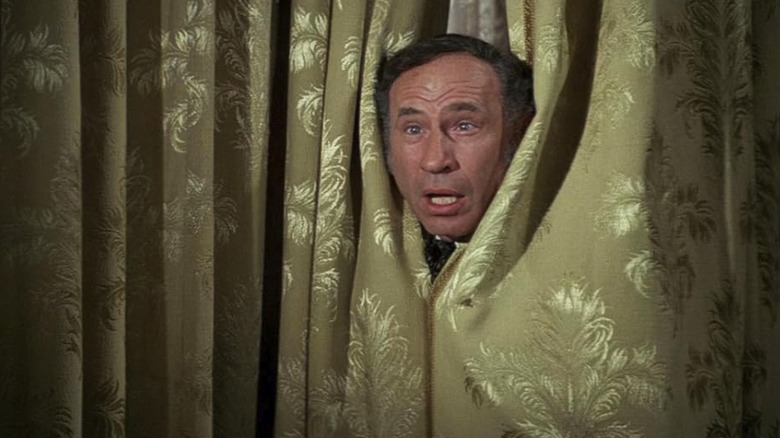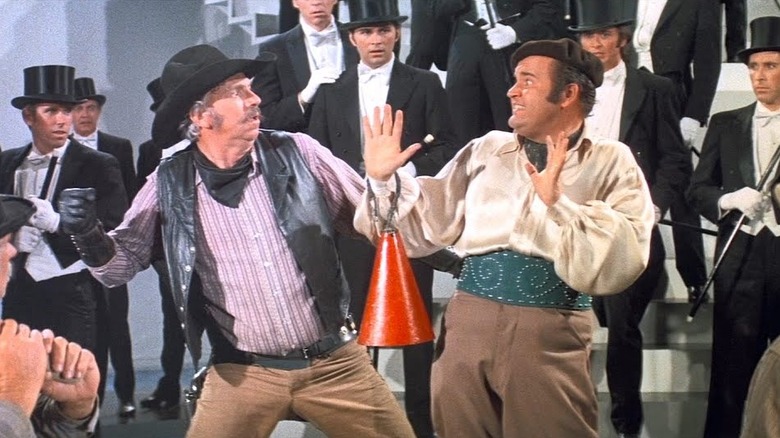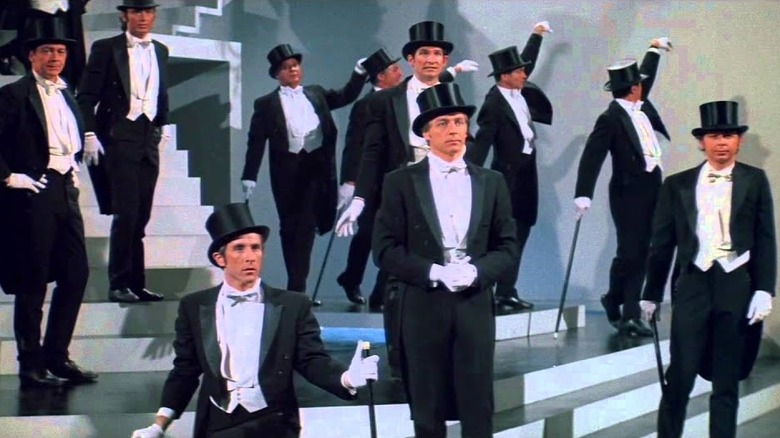
Silence, all you “You couldn’t make ‘Blazing Saddles’ today” fools: it just so happens that Mel Brooks almost wasn’t able to make “Blazing Saddles” in 1974. To be fair, Brooks knew going into making the film that he was looking to push buttons and boundaries, extrapolating from the anything-goes ethos of his prior comedy ventures. In an interview with Entertainment Weekly from 2014, Brooks confessed that his primary interest in making his brand of cinematic anarchy was that he “just wanted to exorcise both my angels and demons.” Brooks encouraged his writers (which consisted of Norman Steinberg, Andrew Bergman, Alan Uger, and Richard Pryor) to “go nuts,” on the assumption that Warner Bros. Pictures would see the finished film and refuse to release it.
Although “Blazing Saddles” was eventually released to great acclaim, becoming one of the most beloved comedy films of all time, Brooks’ assumption did prove well-founded at one point. Surprisingly, WB didn’t take issue with multiple aspects of the movie — and in a movie that contains numerous racial slurs, explicit sexual innuendo, and an overall irreverence, that’s impressive in and of itself. Instead, there was one scene in particular that, according to Brooks, drew the studio’s ire: the big breaking of the fourth wall during the climax of the film, which features the Western characters stumble into a soundstage on the WB lot, where a group of effeminate (re: clearly queer) men are rehearsing and performing a musical number. It’s one of the most clever and memorable scenes in the entire movie, and had Brooks not stuck to his guns, it may have been axed.
Brooks keeps WB from making a (French) mistake
It’s not entirely clear from Brooks’ EW interview whether he means that the entire climax of “Blazing Saddles” was a point of contention for WB, or whether the send-up of classic Warner Bros. musical movies was the issue for the executives. It would make some sense that execs would be worried about a movie literally and figuratively going off the rails in its last several minutes. However, Brooks’ comments seem to confirm that the execs were more concerned over the gay men performing an original song written by Brooks titled “The French Mistake.” Perhaps they felt the director of the musical within the film, Buddy Bizarre (the character played by Dom DeLuise), was too obvious a dig at Busby Berkley, the filmmaker behind such classic WB musicals as “42nd Street” and “Gold Diggers of 1933.” In any case, when asked about this controversy, Brooks explained in his usual matter-of-fact manner why the scene had to stay:
“That was dangerous because I was asked by Warners — they said I can do everything you said, but they kept saying, ‘Don’t do the gay scene. Don’t break through the walls and do the gay scene. You’re crossing a line there.’ I said, ‘Don’t be silly.’ There’s always these musicals being shot at Warner Bros. with top hats and tails and dopiness, you know. I said, ‘It’s a good mixture of cowboys and gay chorus boys.’ So I kept it all in. I had final cut.”
Indeed, unlike many young directors at the mercy of studio executives, Brooks made sure to have final cut on all of his pictures right at the start of his filmmaking career. It was a savvy move, and it turned out to be a necessary one too, as Brooks was aware even as a neophyte how much studios love to meddle. As he explained:
“I got final cut on ‘The Producers,’ and I wouldn’t do any movie unless I got final cut. Because I knew — even on ‘The Producers,’ even with final cut, I had big fights with the studio. They wanted to change 100 things.”
The scene in contention puts a capper on the skewering of machismo in Blazing Saddles
Who knows what it was about the “French Mistake” scene that had WB execs of the period so worried? That they’d be cautious of making fun of gay men would seem odd, given all the other minority groups in the film who get poked at, and it’s not like Berkeley or the movie musical was enjoying any particular popularity at that time. It’s more likely that the “line” that Brooks said they referred to crossing was the skewering of the movie’s characters themselves. After all, one of the genius aspects of the ending of “Blazing Saddles” is how it goes to such lengths to remind the audience that everything they’ve just witnessed is a facade, and the plight of Sheriff Bart (Cleavon Little), Jim the Waco Kid (Gene Wilder), and the townspeople of Rock Ridge has been much ado about nothing. Of course, what Brooks understood about breaking the fourth wall comes from the traditions of stage pioneers like Bertolt Brecht and Antonin Artaud, as well as similar rule-breaking scamps from the cinematic world like Jean-Luc Godard, Luis Buñuel, and others.
The scene also puts a cap on one of the main themes of “Blazing Saddles,” too, which is that deep down, men are highly neurotic, fallible, risible, and silly creatures. It’s a theme that is deliberately at odds with the mythos of the cinematic Western (particularly the U.S. variety), and Brooks indulges in it partially because it’s contrast, and contrast makes for good comedy. Yet he’s also savvy enough to know he’s sending up the entire Western genre and its penchant for unbridled machismo, and the “French Mistake” number pushes that satire to its furthest extreme. So perhaps while the executives could take men being named after women famous for their sex appeal like “Hedley Lamarr,” flatulent cowboys, openly racist and bigoted authority figures, and the plot’s insinuation that the West wasn’t “won” but rather taken through sheer force and oafishness, maybe the combination of breaking the film’s sense of reality with a send-up of an entirely different cinematic genre was too much for them to take.
In the end, of course, Brooks and company’s anarchic full-court press (not to mention the director’s final cut clause) won out, and “Blazing Saddles” was able to ride untamed into theaters everywhere. To paraphrase a lyric from “The French Mistake”: 50 million fans can’t be wrong.




Leave a Reply